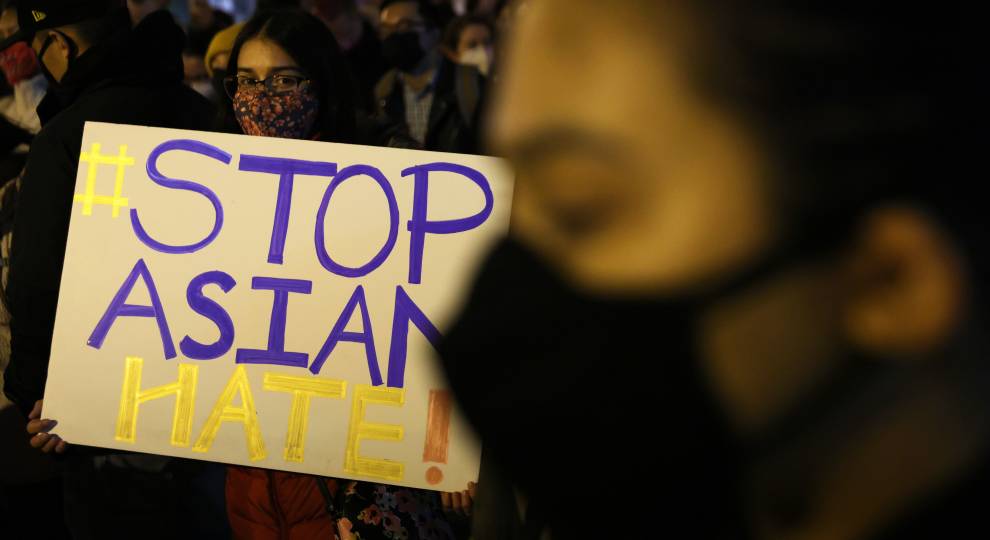
Activists participate in a vigil in response to the Atlanta spa shootings on March 17, 2021, in the Chinatown area of Washington, D.C. A gunman opened fire in three spas in the Atlanta, Ga., area, the day before, killing eight people, including six women of Asian descent.
Alex Wong/Getty Images
By Irene Monroe, April 2, 2021
On March 16, Robert Aaron Long killed eight people, six of whom were women of Asian descent. Long’s action has not yet been classified as a hate crime because the motive, he states, was his sex addiction. The women in the spas he targeted were merely collateral damage in Long’s effort to eliminate his temptation and guilt.
Sex addiction is not a medically recognized diagnosis. And research has proven there is no correlation between sex addiction and killing. Nonetheless, in looking for an explanation for Long’s action other than a hate crime, his church’s “purity culture” is being called into question as a possible motive.
Perhaps during this high holy week of Passover and Easter, it might be a good time to examine one’s theology.
Purity culture became a fast-growing and popular movement in the 1990s in white evangelical churches like Crabtree First Baptist Church, to which Long belonged. It purports to assist teens and young adults in practicing abstinence before marriage. “Believing that true love waits, I make a commitment to God, myself, my family, those I date and my future mate to be sexually pure until the day I enter marriage,” the True Love Waits pledge reads. Purity rings are outward symbols of upholding the pledge. Pop stars like Demi Lovato, Selena Gomez, the Jonas Brothers and Miley Cyrus once wore them before they caved in.
Understandably, Long, like many teens and young adults, wrestled with his sexual urges and purity culture tenets. Given its compulsory heterosexual mandates, its denunciation of present-day gender theories and its denunciation of the fluidity of human sexuality, purity culture’s laundry list of dos and don’ts creates an untenable environment. The psychological toll and spiritual harm have made many teens and young adults like Long leave these churches.
But while the suffering and confusion in these rigid church environments are undeniable, there is no correlation between purity culture and acts of violence or murder.
Most, though not all, mass shooters fall in one demographic group — young white men. The problem of young white men and mass shootings has been screaming out at us for some time. The reasons aren’t as mysterious or elusive as they purport to be. Neither mental illness nor addiction have been the principal causes. Long, like many of these young men, made his private hell a public massacre.
“I think we need to examine critically the fact that most mass shootings are done by young, white, relatively economically privileged males,” an academic administrator from UMass Boston wrote to me in an email. “What is it about their socialization that results in the manifestation of their mental illness in a rage-fueled carnage of this magnitude? If we don’t ask these questions, along with all the others, I fear we are missing an important factor in this and other mass shooting tragedies.”
Entertaining the idea that Long’s sexual addiction drove him to commit these murders diverts attention from his acts of intentional xenophobia and racialized misogyny. Turning Asian American and Pacific Islander, or AAPI, women into fetishes has constantly made their lives expendable to sex traffickers and to men’s violent fantasies. The killings could well have been part of Long’s snuff-film fantasy disguised as removing the source of his temptations.
As Princeton professor Anne Anlin Cheng told The Atlantic, “Hatred does not preclude desire.”
Because of Long, six women of Asian descent are no longer with us: Xiaojie Tan, 49; Doayou Feng, 44; Soon C. Park, 74; Hyun J. Grant, 51; Suncha Kim, 69; and Yong A. Yue, 63. This recent attack highlights the expanse of racist violence against people of color in this country.
With the prevalence of racist, anti-Asian terms for COVID-19, these killings are the consequences of a yearlong verbal and physical attacks on our AAPI siblings across the country.
Sadly, the laws in this country have never protected people of color until we fought to make them protect us. And hate crimes are challenging to prove. In Long’s case, it would have to be proven that he committed the crime solely because the women were Asian. I, however, see Long’s actions as similar to those of Dylan Roof. In 2015, Roof went into Emanuel African Methodist Episcopal Church in Charleston, South Carolina, and killed nine black parishioners during a Wednesday night Bible study.
Not to prosecute Long’s heinous act for what it is — a hate crime — will merely continue anti-Asian hate with impunity.
First published by WGBH on April 2, 2021.



